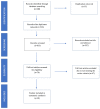Therapeutic Choices for Genitourinary Syndrome of Menopause (GSM) in Breast Cancer Survivors: A Systematic Review and Update
- PMID: 37111307
- PMCID: PMC10142093
- DOI: 10.3390/ph16040550
Therapeutic Choices for Genitourinary Syndrome of Menopause (GSM) in Breast Cancer Survivors: A Systematic Review and Update
Abstract
(1) Background: Genitourinary syndrome of menopause (GSM) is a medical condition that can affect breast cancer survivors (BCS). This is a complication that often can occur as a result of breast cancer treatment, causing symptoms such as vaginal dryness, itching, burning, dyspareunia, dysuria, pain, discomfort, and impairment of sexual function. BCS who experience these symptoms negatively impact multiple aspects of their quality of life to the point that some of them fail to complete adjuvant hormonal treatment; (2) Methods: In this systematic review of the literature, we have analyzed possible pharmacological and non-pharmacological treatments for GSM in BCS. We reviewed systemic hormone therapy, local hormone treatment with estrogens and androgens, the use of vaginal moisturizers and lubricants, ospemifene, and physical therapies such as radiofrequency, electroporation, and vaginal laser; (3) Results: The data available to date demonstrate that the aforementioned treatments are effective for the therapy of GSM and, in particular, vulvovaginal atrophy in BCS. Where possible, combination therapy often appears more useful than using a single line of treatment; (4) Conclusions: We analyzed the efficacy and safety data of each of these options for the treatment of GSM in BCS, emphasizing how often larger clinical trials with longer follow-ups are needed.
Keywords: aromatase inhibitors (AI); breast cancer survivors (BCS); genitourinary syndrome of menopause (GSM); local hormone therapy; vaginal laser therapy; vaginal lubricants; vaginal moisturizers; vulvovaginal atrophy (VVA).
Conflict of interest statement
The authors declare no conflict of interest.
References
-
- Survivor. Dictionary of Cancer Terms. National Cancer Institute. [(accessed on 24 February 2023)]; Available online: https://www.cancer.gov/publications/dictionaries/cancer-terms/def/survivor.
-
- Silvestri M., Cristaudo A., Morrone A., Messina C., Bennardo L., Nisticò S.P., Mariano M., Cameli N. Emerging Skin Toxicities in Patients with Breast Cancer Treated with New Cyclin-Dependent Kinase 4/6 Inhibitors: A Systematic Review. Drug Saf. 2021;44:725–732. doi: 10.1007/s40264-021-01071-1. - DOI - PubMed
Publication types
LinkOut - more resources
Full Text Sources


